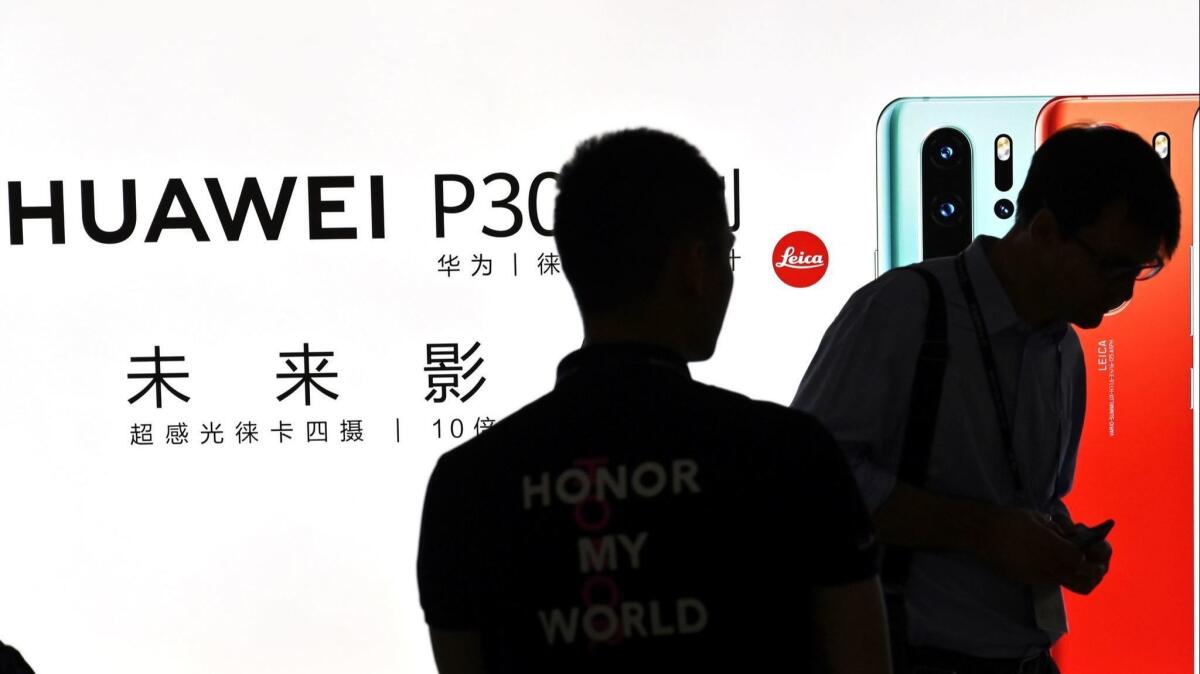Op-Ed: The lesson of the Huawei ban: Digital walls can crumble as quickly as they’re built

The world was marking half a century of information technological progress the week President Trump signed an executive order seemingly designed to halt that progress in its tracks. Issued in mid-May, the order kept Huawei — a leading tech innovator — out of America’s digital networks. At the same time, the Commerce Department effectively banned U.S. companies from selling components to us.
This one-two punch is a challenge for Huawei, headquartered in Shenzhen, China, since we source about a third of our products from the United States. Some have wondered if we can survive this crisis and continue honoring our commitments to customers.
The answer is yes. Huawei pays particular care to supply continuity. We have spent over a dozen years establishing systems and developing key technologies for different types of supply emergencies. Our supply chain is an open system, which means we source our key components from different channels, sources and countries. These measures will keep our business running despite the challenges we currently face.
In striking out at Huawei, the United States will inflict considerable damage on itself. The actions against Huawei alone will seriously hurt U.S. companies, which sold more than $10 billion in goods and services to Huawei last year. The blacklisting of Huawei could wipe out that business. The resulting drop in revenue may force U.S. companies to cut research-and-development spending, threatening their ability to innovate.
In striking out at Huawei, the United States will inflict considerable damage on itself.
The Trump administration’s actions also threaten to split digital technology into separate fiefdoms or tribes. In a divided world, conflicting or incompatible standards may prevent companies from using digital technology on a global scale, an obstacle that relegates them to the status of regional enterprises. And in markets where technology leaders are kept out for political reasons, competition will be reduced, raising costs and leading businesses to curtail their investments. In such markets there will be less innovation overall; companies will produce inferior products, while charging higher prices.
Most troubling is how the U.S. attacks on Huawei will severely damage the global trading system. Over the last 70 years, free trade and open markets have helped create prosperity and relative peace. Yet the current U.S. administration seems to believe international trade should be controlled by government decrees rather than market forces.
Washington says it was motivated to take action because Chinese tech companies threatened U.S. national security or foreign policy interests. But trying to protect communications networks by blacklisting companies is naive. Global supply chains mean that those with criminal intent and the right skills can compromise the equipment of any company or country. Securing digital networks requires a coordinated international response — an outcome that the Trump administration’s actions have yet to produce.
The U.S. government’s actions will inflict short-term pain on the telecommunications and technology industries. Even so, I do not believe the digital world will be split into two camps as a result. A top-down ban will ultimately be rescinded by a bottom-up force: the will of the American business community. Industry groups are already speaking out against the Huawei ban and companies are seeking to be exempted from it. The more U.S. businesses stand to lose, the stronger the resistance will grow. As the New York Times reported Tuesday, some companies have already found loopholes.
Enter the Fray: First takes on the news of the minute »
Outside the U.S., the ban will further damage America’s long-standing credibility as a global leader. Trump’s inconsistent remarks have blurred the line between politics and national security, and other countries will not risk becoming technological laggards simply to follow America’s lead. That’s why some countries, including the United Kingdom, have adopted a cybersecurity model that relies on independent verification of Huawei’s technology. This has allowed the UK to be among the first to roll out a 5G network.
History shows that attempts to contravene open markets and free trade tend to produce weaker, more vulnerable economies. Similarly, previous generations of wireless communications (2G, 3G and 4G) were hamstrung by conflicting technical standards, making the technology more expensive and preventing its use across all markets.
In contrast, 5G creates a universal standard — the natural result of technological evolution and market demand. Some politicians, overestimating their power, may try to erect walls against cooperation, openness and progress. Ultimately, however, they will find that walls can be toppled just as quickly as they are built.
Catherine Chen is a director of the board at Huawei.
More to Read
A cure for the common opinion
Get thought-provoking perspectives with our weekly newsletter.
You may occasionally receive promotional content from the Los Angeles Times.






